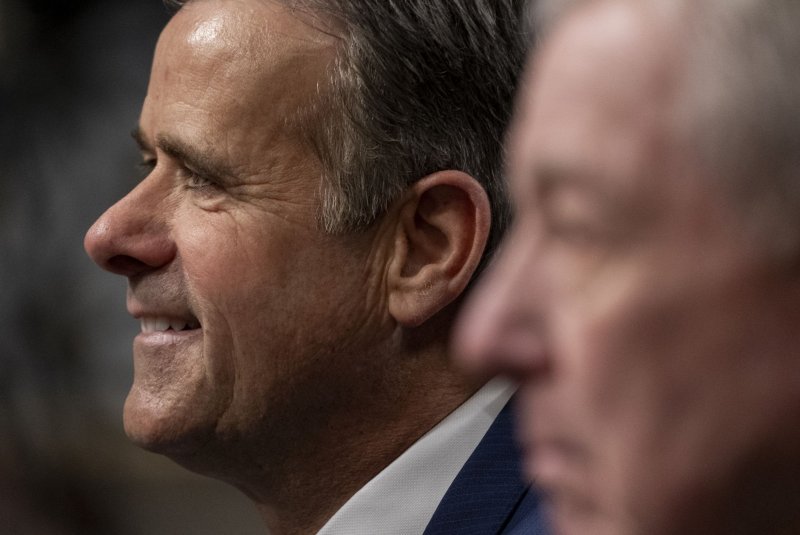Jan. 15 (UPI) — CIA director nominee John Ratcliffe said the agency needs to focus on its mission in the face of growing challenges from China and others during his Senate confirmation hearing Wednesday.
Senate Intelligence Committee Chairman Tom Cotton, R-Ark., said the hearing was held in expectation of President-elect Donald Trump formally nominating Ratcliffe as CIA director after Trump is sworn in on Monday.
“The men and women of the intelligence community perform vital work to protect our nation,” Cotton said. “They often serve in dangerous and squalid conditions. Their successes are seldom celebrated or even known.”
Cotton thanked the nation’s intelligence community for its work but said more is needed.
He cited the New Orleans terrorist attack on New Year’s Day, the collapse of the Assad regime in Syria, Hamas‘ unprovoked attack on Israel on Oct. 7, 2023, and Russia’s preparations for its eventual invasion of Ukraine as examples of recent CIA intelligence failures.
“Suffice it to say, we’re too often in the dark,” Cotton said. “The problem is especially acute at the CIA,” which he said needs to do a better job of obtaining clandestine intelligence.
Cotton said the CIA has become too bureaucratic and is staffed with “talkers instead of doers,” while relying on analysts instead of actual intelligence and has produced inaccurate intelligence while focusing on diversity, equity and inclusion over intelligence gathering.
“The nation needs a strong, capable and aggressive CIA,” Cotton told Ratcliffe. “The men and women you will lead deserve to serve in that kind of agency.”
Former Attorney General John Ashcroft spoke on Ratcliffe’s behalf and called him a “tough and fair interrogator” who supports the Constitution, upholds the law and is qualified to lead the CIA.
Ratcliffe told committee members he would focus on recruiting talent at the CIA and said complacency is tolerated there due to a “remarkably low turnover among its workforce.”
“The CIA must be a place that incentivizes and rewards meaningful contributions to our nation’s security and holds accountable low performers and bad actors who are not focused on our mission,” Ratcliffe said.
The CIA needs people who hold a “Ph.D. but could win a bar fight” while building pathways for mid-career professionals to fill gaps in the agency’s workforce, he told committee members.
Ratcliffe said he also will focus on using technology capable of supporting the CIA’s mission and enhancing its capabilities, including AI-powered large language models for analysis.
“Our adversaries, including one in particular, understand that the nation who wins the race of the emerging technologies of today will dominate the world of tomorrow,” Ratcliffe said.
He cited China and the Chinese Communist Party as “far and away” the nation’s top national security threat.
He said the recent creation of the CIA’s China Mission Center is an example of the type of work that must continue to preserve peace and spread prosperity in the face of aggressive adversaries.
Ratcliffe told the committee the CIA must remain the world’s “premier clandestine collector of human intelligence” and must make the collection of human intelligence its primary focus.
He said the CIA will “steal secrets” because “good decisions are hostage to good intelligence, and the better we do at collecting human intelligence, the better decisions you all can make.”
Sen. Susan Collins, R-Maine, asked how Ratcliffe would improve recent CIA miscues that failed to predict the Hamas attack on Israel, Russia’s invasion of Ukraine, the sudden collapse of the Syrian regime and the Taliban’s rapid seizure of control over Afghanistan.
Ratcliffe said improving technology to support surveillance can improve outcomes, but said improving human intelligence collection is most important.
Ratcliffe also assured committee members he would not allow the CIA to become politicized and would “speak truth to power” instead of suppressing intelligence information.
“If you have a politically motivated, bureaucratically imposed social justice agenda that takes up your attention, that can distract from the core mission of collecting human intelligence that matters and providing it to you in a timely way,” Ratcliffe said.
He said the nation faces virtual adversaries who would cross digital boundaries to obtain information and physical adversaries who would cross the U.S. border to undertake acts of terrorism.
The committee continued its confirmation hearing behind closed doors after closing the public hearing portion, which lasted for more than two hours.
Committee members anticipate voting on Ratcliffe’s nomination on Monday after receiving the formal nomination after Trump takes the oath of office.
